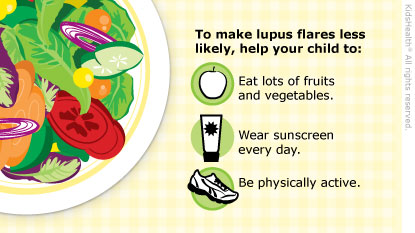Lupus: How to Care for Your Child
Kids with lupus can feel sick at times when the body's immune system attacks healthy cells by mistake. This is called a lupus flare. Follow these instructions to make flares less likely.


-
If the health care professional prescribed medicines, give them to your child as directed.
-
Set up appointments with the health care professional as recommended. Kids with lupus need regular checkups even if they don't feel sick.
-
Help your child get enough rest. Kids with lupus need more sleep than other kids.
-
The sun can lead to a lupus flare. Your child should:
-
Wear sunscreen every day, even in winter. Use "broad-spectrum" sunscreen with an SPF of 55 or higher and put it on 30 minutes before going outside.
-
Wear a wide-brimmed hat and clothing that covers the skin when outside.
-
Avoid the sun between 10 a.m. and 3 p.m.
-
A well-balanced diet can help your child avoid flares:
-
Help your child eat plenty of fruits and vegetables.
-
Include foods (such as dairy products; fortified foods and drinks; and broccoli, bok choy, and kale) that will help your child get enough calcium.
-
Kids 4–8 years old need at least 800 milligrams of calcium per day (the amount in about 2 ½ glasses of milk).
-
Kids 9 years and older need at least 1,300 milligrams of calcium per day (the amount in about 4 ½ glasses of milk).
-
Ask the health care professional if your child needs additional vitamin D.
-
Avoid foods like garlic and alfalfa, which may make flares more likely.
-
Encourage your child to get exercise every day.
-
To prevent infections, make sure your child:
-
-
Gets all vaccines recommended by the health care professional, including a flu shot every year.
-
Doesn't share food or drinks with others.
-
Doesn't get piercings or tattoos.
-
Help your child avoid smoking and drug use. They make flares more likely.
-
Teens who have sex should talk to the health care professional about what type of birth control is best for them. Girls who get pregnant during a lupus flare can have serious health problems.
-
Teach your child healthy ways to manage stress. Encourage your child to talk about feelings. Talking to a therapist or other mental health professional may help.

You have any questions or your child:
-
Has a new or high fever.
-
Is more tired or weaker than usual.
-
Has new or worse pains or aches.
-
Seems confused or forgetful.
-
Has brown pee.
-
Develops new swelling, a rash, mouth sores, pain, vomiting, or other signs of illness.
-
Begins bruising or bleeding easily.
-
Has trouble drinking fluids or is eating less than usual.

Your child:
-
Has pain when breathing or is short of breath.
-
Has sudden, severe chest pain that does not go away after a few minutes.
-
Has a seizure.
-
Seems dehydrated. Signs include dizziness, drowsiness, a dry or sticky mouth, sunken eyes, crying with few or no tears, or peeing less often.

What is lupus? Lupus is a lifelong illness of the body's immune (germ-fighting) system. When a person has lupus, the immune system can't tell the difference between healthy cells and germs. It mistakes the body's healthy cells for dangerous germs and attacks them.
How is lupus treated? Health care professionals give parents and kids advice on healthy-living changes that can make lupus flares less likely. Kids with lupus often get medicines to:
-
Keep the immune system from attacking healthy cells.
-
Reduce inflammation (pain and swelling).
-
Treat other problems that happen because of lupus.